Keep up with our latest stories, cross-checked articles, and resources for young and new muslims here!
If you have an Islamic research or opinion article that you would like to publish on our site, feel free to get in touch using our contact form. We ask that you agree to the terms of our disclaimer found at the end of each article – namely to follow Islamic principles of reasoning, and allow an internal review of the content – before it may be published. Jazak-Allah kaira.
View by category:
- Being Principled (1)
- No Blind Belief (2)
- Tajweed Tips (9)
- Torbay Updates (2)
- A Perfect Ten: Learn Quranic Arabic in 10 Coloured Tables
 Written by Noorislam Uddin (MArch)Checked by Mostafa Rady (MEng) وَقُل رَّبِّ زِدْنِى عِلْمًۭا Ans say, “Increase my knowledge, my Lord.” [Quran 20:114] Arabic is composed of 2, 3, and sometimes 4 letter words. Most words can be traced back to a 3-letter root, which is the basis for a family of words each with related …
Written by Noorislam Uddin (MArch)Checked by Mostafa Rady (MEng) وَقُل رَّبِّ زِدْنِى عِلْمًۭا Ans say, “Increase my knowledge, my Lord.” [Quran 20:114] Arabic is composed of 2, 3, and sometimes 4 letter words. Most words can be traced back to a 3-letter root, which is the basis for a family of words each with related …Continue reading “A Perfect Ten: Learn Quranic Arabic in 10 Coloured Tables”
- Quranic Arabic Stop Signs (Waqf) – Tajwid Enhancement Lesson 7Written by Noorislam Uddin (MArch) فَلَا يَحْزُنكَ قَوْلُهُمْ ۘ إِنَّا نَعْلَمُ مَا يُسِرُّونَ وَمَا يُعْلِنُونَ Falá yaḥzuńka qouluhum. Ìnná na’lamu má yusirrúna wamá yu’linúna [Quran 36:76…] Sometimes in English, we feel too exhausted to say our words fully. If you work in an office, trying switching out ‘admin‘, ‘decaf‘, ‘app‘, and ‘doc‘, for ‘administration‘, ‘decaffeinated‘, …
Continue reading “Quranic Arabic Stop Signs (Waqf) – Tajwid Enhancement Lesson 7”
- Quranic Arabic General Fusion (Ìdgóm ul’ám) – Tajwid Enhancement Lesson 6Written by Noorislam Uddin (MArch) أَيْنَمَا تَكُونُوا۟ يُدْرِككُّمُ ٱلْمَوْتُ وَلَوْ كُنتُمْ فِى بُرُوجٍۢ مُّشَيَّدَةٍۢ Ànamá takúnúa yudrikkkumu almautu walau kuńtum fie burújiņ mmuṡayyadaḧiņ… [Quran 4:78…] Sometimes speaking makes the tongue tired. Given all the various sounds this fleshy set of muscles works to produce, we can all excuse a shortcut being made once in a …
Continue reading “Quranic Arabic General Fusion (Ìdgóm ul’ám) – Tajwid Enhancement Lesson 6”
- Quranic Arabic Plosion (Qolqolaḧ) – Tajwid Enhancement Lesson 5Written by Noorislam Uddin (MArch) وَأَمَّا ٱلَّذِينَ فِى قُلُوبِهِم مَّرَضٌۭ فَزَادَتْهُمْ رِجْسًا إِلَىٰ رِجْسِهِمْ وَمَاتُوا۟ وَهُمْ كَـٰفِرُونَ Waàmmá allavína fie qulúbihim mmaroḍuń fazádathum rijsana ìlaē rijsihim wamátúa wahum kāfirúna [Quran 9:125] When the Arabs cooked over an open fire, the pot would often get hot enough to start vibrating. The word used for this phenomenon, …
Continue reading “Quranic Arabic Plosion (Qolqolaḧ) – Tajwid Enhancement Lesson 5”
- Quranic Arabic M-Pause (Mím Sákinaḧ) – Tajwid Enhancement Lesson 4Written by Noorislam Uddin (MArch) فَتَنَـٰزَعُوٓا۟ أَمْرَهُم بَيْنَهُمْ وَأَسَرُّوا۟ ٱلنَّجْوَىٰ Fatanäza’ũa ámrohuṁ bainahum waásarrūa alṇnajwaë [Quran 20:62] Sometimes letters are emphasised by extending them. Say the word ‘room mate‘. The two ‘m‘ sounds here feel so repetitive that you might have just merged them into a longer ‘mm‘ – giving something like ‘roo-mm-ate‘. Pronouncing the …
Continue reading “Quranic Arabic M-Pause (Mím Sákinaḧ) – Tajwid Enhancement Lesson 4”
- Quranic Arabic N-Pause (Nún Sákinaḧ) – Tajwid Enhancement Lesson 3Written by Noorislam Uddin (MArch) قَالُوا۟ فَمَا جَزَٰٓؤُهُۥٓ إِن كُنتُمْ كَـٰذِبِينَ Qólúa famá jazã-uhũ ìń kuńtum kāvibína [Quran 12:74] Some vocal sounds are quite difficult to render in sequence. Say the word ‘month‘. The ‘n‘ here is so uncomfortable (often especially for foreign speakers) that you might have just merged the ‘n‘ into the ‘th‘ …
Continue reading “Quranic Arabic N-Pause (Nún Sákinaḧ) – Tajwid Enhancement Lesson 3”
- Quranic Arabic Elongation (Madd) – Tajwid Enhancement Lesson 2Written by Noorislam Uddin (MArch) ذَٰلِكَ ٱلْكِتَـٰبُ لَا رَيْبَ ۛ فِيهِ ۛ هُدًۭى لِّلْمُتَّقِينَ Välika alkitäbu lā roiba – fīhi – hudaṇe llilmuttaqīna [Quran 2:2] The Arabic word [ مَدّ ] madd means ‘extension’, or ‘elongation’. The principle of madd elongation exists in almost every language for rhythmic purposes, or as a method to distinguish …
Continue reading “Quranic Arabic Elongation (Madd) – Tajwid Enhancement Lesson 2”
- Quranic Arabic Heaviness (Tafcím) – Tajwid Enhancement Lesson 1Written by Noorislam Uddin (MArch) أَنِ ٱعْمَلْ سَـٰبِغَـٰتٍۢ وَقَدِّرْ فِى ٱلسَّرْدِ ۖ وَٱعْمَلُوا۟ صَـٰلِحًا ۖ إِنِّى بِمَا تَعْمَلُونَ بَصِيرٌۭ Áni a‘mal säbigöẗiṇ waqoddir fie alssardi, waa‘malūa ṣöliḥana, íṇnie bimā ta’malūna baṣīruṇ [Quran 34:11] The ‘weight’ of a letter in Arabic relates to the nature of its macroj ‘exit point’ from the mouth, and its corresponding …
Continue reading “Quranic Arabic Heaviness (Tafcím) – Tajwid Enhancement Lesson 1”
- What is Islam? A quick guide for the curious
 Written by Noorislam Uddin (MArch)Checked by Mostafa Rady (MEng) قُلْ هُوَ ٱللَّهُ أَحَدٌSay, “He is the only God. [Quran 112:1] Islam is a way of life that peacefully accepts one true God – Allah – as the only unconditional Master of all creation. The word ‘Islam’ derives from the Arabic for ‘submission’, that is, to …
Written by Noorislam Uddin (MArch)Checked by Mostafa Rady (MEng) قُلْ هُوَ ٱللَّهُ أَحَدٌSay, “He is the only God. [Quran 112:1] Islam is a way of life that peacefully accepts one true God – Allah – as the only unconditional Master of all creation. The word ‘Islam’ derives from the Arabic for ‘submission’, that is, to …Continue reading “What is Islam? A quick guide for the curious”
- A quranic guide to new muslim loneliness
 Written by Noorislam Uddin (MArch)Checked by Mostafa Rady (MEng) وَٱلضُّحَىٰ ١ وَٱلَّيْلِ إِذَا سَجَىٰ ٢ مَا وَدَّعَكَ رَبُّكَ وَمَا قَلَىٰ ٣ waalḍḍuḥaē 1 • waallaili ìvá sajaē 2 • má wadda’aka Robbuka wamá qolaē 31. By the morning [light],2. And the night when is darkens,3. Your Master had not abandoned, nor dismissed, you. [Quran 93:1-3] …
Written by Noorislam Uddin (MArch)Checked by Mostafa Rady (MEng) وَٱلضُّحَىٰ ١ وَٱلَّيْلِ إِذَا سَجَىٰ ٢ مَا وَدَّعَكَ رَبُّكَ وَمَا قَلَىٰ ٣ waalḍḍuḥaē 1 • waallaili ìvá sajaē 2 • má wadda’aka Robbuka wamá qolaē 31. By the morning [light],2. And the night when is darkens,3. Your Master had not abandoned, nor dismissed, you. [Quran 93:1-3] …


